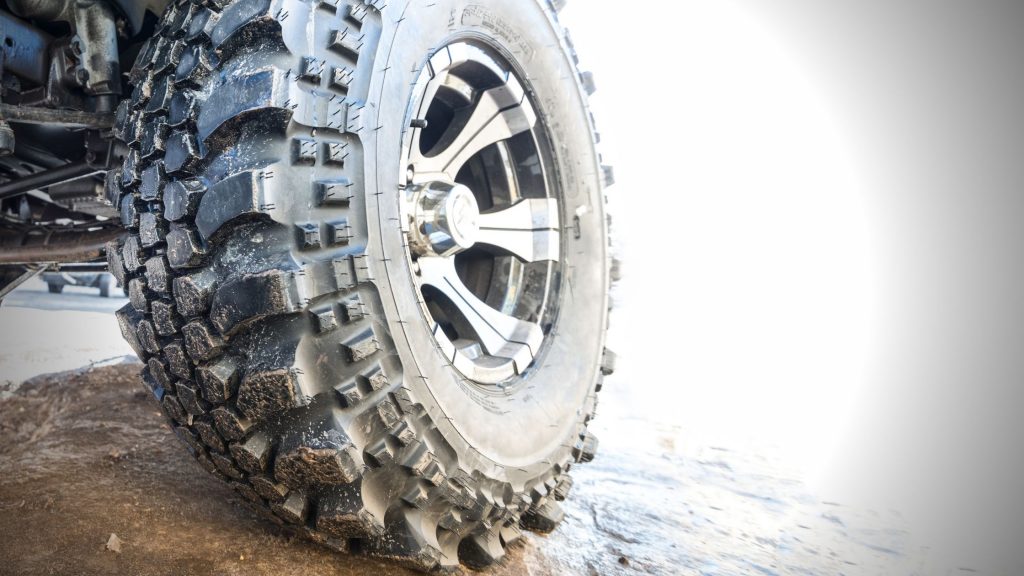We all love off-roading, but sometimes getting from your house may prove more eventful.
What do you do when you have a big set of mud tires on, but want to go wheeling, you need to cross some blacktop?
Let’s first answer the question before digging in
Yes, you can use off-road tires on the highway and other roads. Most off-road and mud tires are street legal. However, due to the construction of off-road tires, you may face reduced handling, increased road noise, and increased wear.
What is an off-road tire?
Now we know it’s possible to use an off-road tire on road, let’s first look at what constitutes an off-road tire.
An off-road tire is any tire that has is specifically designed for the intention of traveling off standard roads.
What differentiates an off-road tire from a standard tire?
The differences between an off-road tire and a standard tire become obvious when you look at them up close. Off-road tires have a more aggressive tread pattern to help them grip surfaces such as mud, rock, gravel, etc.
You will also find off-road tires have sidewall lugs which are big rubber blocks on the side of the tire. These lugs are also there to provide extra grip.
Another difference between off-road tires and standard tires is the sidewall construction. Off-road tires usually have a 3 ply sidewall, whereas normal car tires only have a 1 ply sidewall.
Can I use off-road tires on highway?
There are no laws prohibiting you from using off-road tires on the highway. However, whether you would want to is another question.
Granted, off-road tires are becoming much more user-friendly they are still not at a place where I would be comfortable using them on a highway.
I once made a 1000 mile journey in a Land Rover Discovery 2 with off-road tires. To say that was a miserable journey would be an understatement.
The road noise was so loud we had to shout to have a conversation. The journey was made during summer; between the heat and the soft compound, it ate through the tires like butter.
Still, I would prefer to make that journey during the summertime because, during winter, when the roads are icy or covered with snow, off-road tires become dangerous.
The design of mud tires uses chunky tread blocks to grip and evacuate mud. This design doesn’t work well on the road. Any snow would get packed into the evacuation channels and not clear, thus creating one big snowball.
Mud tires also lack the siping of a normal tire, meaning they can’t grip the road well.
One of the biggest issues with using off-road tires on the road during cold weather is they will harden and perform poorly.
Mud tires use a soft compound to meet the demands it faces off-road where it needs to be pliable. In cold weather on-road, this soft compound becomes quite hard and affects the performance of the tire.
How long will mud tires last?

Mud Tires we’re known for not being very long-lasting. This was because of the compound used during construction. However, when used for what they were originally intended for, mud tires can last quite a long time.
Most owners can generally get between 20,000 – 40,000 miles from a set of mud tires.
This number reduces drastically the more you use your mud tires on the road.
I find that I can usually get 30,000 miles from most of my off-road tires. I generally travel service trails and mud.
Rock crawling will also reduce the lifespan of your tires as you need to heat them up, so the rubber really grips the rock face. Go to any trails in Moab, and you will see plenty of rubber left behind on the rocks.
Like any tires, rotating them will help to prolong the life of your tire. This includes rotating in the spare tire.
Do off-road tires ride rough?
When off-road tires are used off-road, then they ride better than a standard tire. When off-roading, you are moving at a much slower speed, and the soft compound molds over the surfaces, cushioning the ride.
When it comes to using off-road tires on highways or other roads, they ride quite rough.
Technology is improving, but as it stands, off-road tires still ride quite poorly on road when compared to standard tires.
Because of the aggressive grip and big voids, off-road tires tend to vibrate a lot when on paved surfaces. The more aggressive the grip, the rougher the ride will be.
Another issue with using of-road tires on the road is they will wander. When you hit any dip or hole in the road and get any momentary grip, the off-road tire will pull in that direction.
If you can avoid using off-road tires on the road, take that option. But if you have to use off-road tires on the road, drive slowly and avoid icy or snowy conditions.
Are all-terrain tires good on the highway?
All-terrain tires aren’t exactly an off-road tire or an on-road tire. They are a hybrid between the two.
All-terrain tires are the best option for most overlanders on off-roaders that don’t like to go too hard.
These tires were designed to be grippy and pliable enough off-road yet be mannerly on the road.
I have never had any issues with all-terrain tires on the road. They perform exceptionally well in cold, snowy, or icy weather, they are not much more audible than standard tires, and they handle perfectly.
The only drawback with all-terrain tires is that they don’t perform great in muddy conditions.
Conclusion
If your aim is to go overlanding, I feel you will be better off with all-terrain tires. This is what I mostly use, with my current set being bf Goodrich KO2s.
If you are planning on rock crawling or spending a lot of time on challenging off-road conditions, you may find mud tires a better fit.
Now you know that you can use them on the road, but beware aware of the drawbacks of doing so, and try not to use them during snowy or icy conditions.
- Tips and tricks For Setting Up Camp Like a Pro - September 11, 2023
- The Best Multi-Tools for Overlanding Adventures - August 25, 2023
- Off-Road Navigation Tips for Overlanders - August 13, 2023


